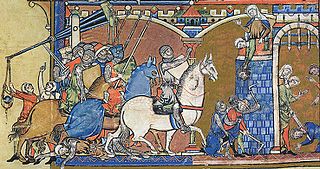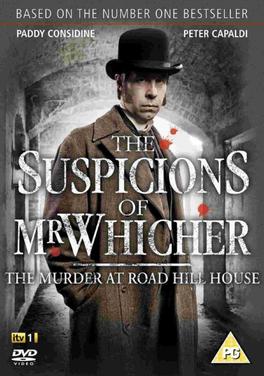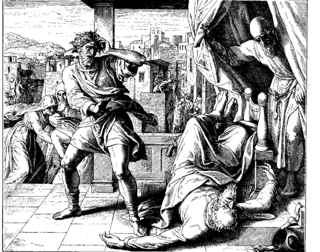
Absalom was the third son of David, King of Israel with Maacah, daughter of Talmai, King of Geshur.
The Book of Samuel is a book in the Hebrew Bible, found as two books in the Old Testament. The book is part of the Deuteronomistic history, a series of books that constitute a theological history of the Israelites and that aim to explain God's law for Israel under the guidance of the prophets.

Tel Abel Beth Maacah is a large archaeological tell with a small upper northern section and a large lower southern one, connected by a saddle. It is located on the northern border of present-day Israel, about 2 km south of the town of Metula and about 6.5 km west of Tel Dan.

Amasa (עמשא) or Amessai is a person mentioned in the Hebrew Bible. His mother was Abigail, a sister of King David. Hence, Amasa was a nephew of David, and cousin of Joab, David's military commander, as well as a cousin of Absalom, David's son. David calls him "my bone and my flesh". Amasa's father was Jether who was also called Ithra.

Joab the son of Zeruiah, was the nephew of King David and the commander of his army, according to the Hebrew Bible.

Uriah the Hittite is a minor figure in the Hebrew Bible, mentioned in the Books of Samuel, an elite soldier in the army of David, king of Israel and Judah, and the husband of Bathsheba, the daughter of Eliam. While Uriah was serving in David's army abroad, David himself, from the roof of his palace, looked down on his city and spied upon Bathsheba bathing in the privacy of her courtyard. Moved by lust at the sight of her, David called for Bathsheba to be brought to him and slept with her, impregnating her. In an effort to hide his misdeeds, David called Uriah home from war, hoping that he and Bathsheba would have relations and that he would be able to pass the child off as belonging to Uriah. But Uriah, being a disciplined soldier, refused to visit his wife. So David murdered him by proxy by ordering all of Uriah's comrades to abandon him in the midst of battle, so that he ended up getting killed by an opposing army. Following Uriah's death, David took Bathsheba as his eighth wife.

The Queen of Sheeba is a figure first mentioned in the Hebrew Bible. In the original story, she brings a caravan of valuable gifts for the Israelite King Solomon. This account has undergone extensive Jewish, Islamic, Yemenite and Ethiopian elaborations, and it has become the subject of one of the most widespread and fertile cycles of legends in West Asia and East Africa.

In the Old Testament, Sheba was a Benjaminite leader who revolted against King David, recounted in 2 Samuel.

The Queen of Sheba is a 1921 American silent drama film produced by Fox studios about the story of the ill-fated romance between Solomon, King of Israel, and the Queen of Sheba. Written and directed by J. Gordon Edwards, it starred Betty Blythe as the Queen and Fritz Leiber Sr. as King Solomon. The film is well known amongst silent film buffs for the risqué costumes worn by Blythe, as evidenced by several surviving stills taken during the production. Only a short fragment of the film survives.

David's Mighty Warriors are a group of 37 men in the Hebrew Bible who fought with King David and are identified in 2 Samuel 23:8–38, part of the "supplementary information" added to the Second Book of Samuel in its final four chapters. The International Standard Version calls them "David's special forces".

Solomon and Sheba is a 1959 American epic historical romance film directed by King Vidor, shot in Technirama, and distributed by United Artists. The film dramatizes events described in The Bible—the tenth chapter of First Kings and the ninth chapter of Second Chronicles.

State Fair is a musical with a book by Tom Briggs and Louis Mattioli, lyrics by Oscar Hammerstein II, and music by Richard Rodgers.

Allusions in rabbinic literature to the Biblical character Joab, the nephew of King David and commander of his army, contain various expansions, elaborations and inferences beyond what is presented in the text of the Bible itself.

The Kingdom of Solomon is an Iranian religious/historical film series produced by Mojtaba Faravardeh and directed by Shahriar Bahrani who has made Saint Mary before. The Kingdom of Solomon was going to be released internationally in November 2010 after its screening in Iran, but due to some technicalities its global release was delayed. The film tells the life story of Prophet Solomon, the King of Israelites. It is mostly based on the Islamic accounts of Solomon's prophetic life extracted from the Qur'an but it also draws upon parallels found in some Jewish texts.

The Suspicions of Mr Whicher is a British series of television films made by Hat Trick Productions for ITV, written by Helen Edmundson and Neil McKay. It stars Paddy Considine in the title role of detective inspector Jack Whicher of the Metropolitan Police. The first film, The Murder at Road Hill House, was based on the real-life Constance Kent murder case of 1860, as interpreted by Kate Summerscale in her 2008 book The Suspicions of Mr Whicher or The Murder at Road Hill House, which was the winner of Britain's Samuel Johnson Prize for Non-Fiction in 2008, and was read as BBC Radio 4's Book of the Week in April the same year.

2 Samuel 11 is the eleventh chapter of the Second Book of Samuel in the Old Testament of the Christian Bible or the second part of Books of Samuel in the Hebrew Bible. According to Jewish tradition the book was attributed to the prophet Samuel, with additions by the prophets Gad and Nathan, but modern scholars view it as a composition of a number of independent texts of various ages from c. 630–540 BCE. This chapter contains the account of David's reign in Jerusalem. This is within a section comprising 2 Samuel 9–20 and continued to 1 Kings 1–2 which deal with the power struggles among David's sons to succeed David's throne until 'the kingdom was established in the hand of Solomon'.

The woman of Tekoa is an unnamed figure in the Hebrew Bible. She appears in 2 Samuel 14, after Absalom has been banished following his murder of Amnon. Joab wants David to be reconciled to Absalom, and he sends to Tekoa to find a "wise woman". Joab tells the woman to pretend to be mourning, and she tells a story to David to elicit his sympathy and obtain his favourable judgement. The woman says that her son killed his brother, and now the rest of the family wants to kill him. When David decides that her son should be spared, the Tekoite woman tells him that he should do the same for Absalom.

The wife of Phinehas is an unnamed character in the Hebrew Bible. Her story covers just a few verses at the end of 1 Samuel 4, where she is introduced as the daughter-in-law of Eli and the wife of Phinehas. She is about to give birth when she hears that the Ark of God had been captured by the Philistines. She dies in childbirth, and calls her son "Ichabod", saying, "The glory has departed from Israel."

2 Samuel 14 is the fourteenth chapter of the Second Book of Samuel in the Old Testament of the Christian Bible or the second part of Books of Samuel in the Hebrew Bible. According to Jewish tradition the book was attributed to the prophet Samuel, with additions by the prophets Gad and Nathan, but modern scholars view it as a composition of a number of independent texts of various ages from c. 630–540 BCE. This chapter contains the account of David's reign in Jerusalem. This is within a section comprising 2 Samuel 9–20 and continued to 1 Kings 1–2 which deal with the power struggles among David's sons to succeed David's throne until 'the kingdom was established in the hand of Solomon'.

2 Samuel 20 is the twentieth chapter of the Second Book of Samuel in the Old Testament of the Christian Bible or the second part of Books of Samuel in the Hebrew Bible. According to Jewish tradition the book was attributed to the prophet Samuel, with additions by the prophets Gad and Nathan, but modern scholars view it as a composition of a number of independent texts of various ages from c. 630–540 BCE. This chapter contains the account of David's reign in Jerusalem. This is within a section comprising 2 Samuel 9–20 and continued to 1 Kings 1–2 which deal with the power struggles among David's sons to succeed David's throne until 'the kingdom was established in the hand of Solomon'.

















